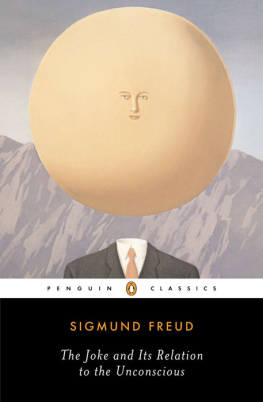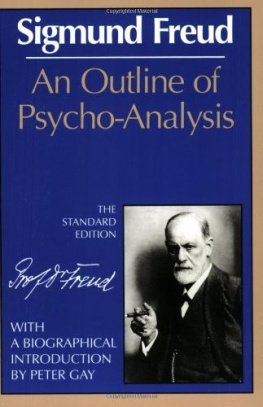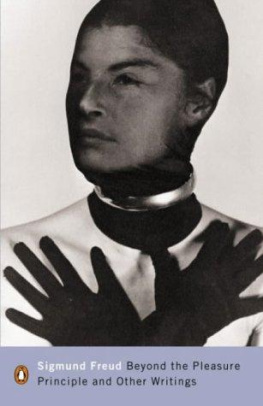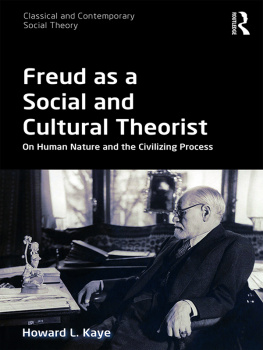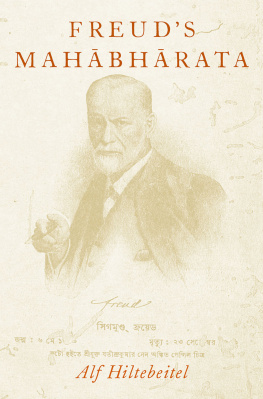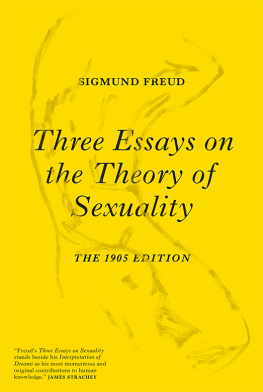PENGUIN BOOKS
THE NEW PENGUIN FREUD
GENERAL EDITOR: ADAM PHILLIPS
The Psychology of Love
Sigmund Freud was born in 1856 in Moravia; between the ages of four and eighty-two his home was in Vienna: in 1938 Hitlers invasion of Austria forced him to seek asylum in London, where he died in the following year. His career began with several years of brilliant work on the anatomy and physiology of the nervous system. He was almost thirty when, after a period of study under Charcot in Paris, his interests first turned to psychology; and after ten years of clinical work in Vienna (at first in collaboration with Breuer, an older colleague) he invented what was to become psychoanalysis. This began simply as a method of treating neurotic patients through talking, but it quickly grew into an accumulation of knowledge about the workings of the mind in general. Freud was thus able to demonstrate the development of the sexual instinct in childhood and, largely on the basis of an examination of dreams, arrived at his fundamental discovery of the unconscious forces that influence our everyday thoughts and actions. Freuds life was uneventful, but his ideas have shaped not only many specialist disciplines, but also the whole intellectual climate of the twentieth century.
Jeri Johnson is a Fellow in English at Exeter College, Oxford. She has written on textual theory, feminist literary theory, Virginia Woolf and James Joyce, and has also edited Joyces Ulysses.
Shaun Whiteside was educated at the Royal School, Dungannon, and Kings College, Cambridge, where he graduated with a First in Modern Languages. His translations from French, German, Dutch and Italian include Nietzsches The Birth of Tragedy, Beatrice and Her Son by Arthur Schnitzler and The Confusions of Young Trless by Robert Musil, all of which have been published by Penguin.
Adam Phillips was formerly Principal Child Psychotherapist at Charing Cross Hospital in London. He is the author of several books on psychoanalysis including On Kissing, Tickling and Being Bored, Darwins Worms, Promises, Promises and Houdinis Box.
SIGMUND FREUD
The Psychology of Love
Translated by Shaun Whiteside with
an Introduction by Jeri Johnson

PENGUIN BOOKS
PENGUIN BOOKS
Published by the Penguin Group
Penguin Books Ltd, 80 Strand, London WC2R 0RL, England
Penguin Group (USA) Inc., 375 Hudson Street, New York, New York 10014, USA
Penguin Group (Canada), 90 Eglinton Avenue East, Suite 700, Toronto, Ontario, Canada M4P 2Y3
(a division of Pearson Penguin Canada Inc.)
Penguin Ireland, 25 St Stephens Green, Dublin 2, Ireland (a division of Penguin Books Ltd)
Penguin Group (Australia), 250 Camberwell Road, Camberwell, Victoria 3124, Australia
(a division of Pearson Australia Group Pty Ltd)
Penguin Books India Pvt Ltd, 11 Community Centre, Panchsheel Park, New Delhi 110 017, India
Penguin Group (NZ), cnr Airborne and Rosedale Roads, Albany, Auckland 1310, New Zealand
(a division of Pearson New Zealand Ltd)
Penguin Books (South Africa) (Pty) Ltd, 24 Sturdee Avenue,
Rosebank, Johannesburg 2196, South Africa
Penguin Books Ltd, Registered Offices: 80 Strand, London WC2R 0RL, England
www.penguin.com
Bruchstck einer Hysterie-Analyse first published in 1905 (Basle) in
Monatschrift fr Psychiatrie und Neurologie
Drei Abhandlungen zur Sexualtheorie first published in 1905 (Leipzig, Vienna)
ber infantile Sexualtheorien first published in 1908 (Frankfurt-am-Main) in
Sexual-Probleme (Mutterschutz)
ber einen besonderen Typus der Objektwahl beim Manne first published in
1910 (Leipzig, Vienna) in Jahrbuch fr psychoanalytische und
psychopathologische Forschungen
ber die allgemeinste Erniedrigung des Liebeslebens first published in 1912
(Leipzig, Vienna) in Jahrbuch fr psychoanalytische und psychopathologische
Forschungen
Das Tabu der Virginitt first published in 1918 (Leipzig) in Sigmund Freud,
Sammlung kleiner Schriften zur Neurosenlehre
Ein Kind wird geschlagen: Beitrag zur Kenntnis der Entstellung sexueller
Perversionen first published in 1919 (Leipzig) in Internationale Zeitschrift fr
rztliche Psychoanalyse
ber die weibliche Sexualitt first published in 1931 (Leipzig) in Internationale
Zeitschrift fr rztliche Psychoanalyse
This translation published in Penguin Classics 2006
1
Sigmund Freuds German texts collected in Gesammelte Werke (194052)
copyright Imago Publishing Co., Ltd, London, 1905, 1908, 1910, 1912, 1918, 1919, 1931
Translation and editorial matter copyright Shaun Whiteside, 2006
Introduction copyright Jeri Johnson, 2006
All rights reserved
The moral rights of the translator and author of the Introduction have been asserted
Except in the United States of America, this book is sold subject to the condition that it shall not, by way of trade or otherwise, be lent, re-sold, hired out, or otherwise circulated without the publishers prior consent in any form of binding or cover other than that in which it is published and without a similar condition including this condition being imposed on the subsequent purchaser
9780141912059
Contents
Translators Preface
|
Fragment of an Analysis of Hysteria (Dora)
|
Three Essays on Sexual Theory
|
Recapitulation
|
On the Sexual Theories of Children
|
Contributions to the Psychology of Erotic Life
|
Concerning the Most Universal Debasement in Erotic
Life |
A Child is being Beaten
Contribution to the Understanding of the Origin of Sexual
Perversions
|
Introduction
Everyone knows that Freud changed everything. Freud changed everything by making everything about sex. Like the serpent urging the apple on Eve, Sigmund Freud brought sex to a world until then innocent, Edenic. When Freud published his theories, the era into which he wrote, having convinced itself publically at least of its own piety, could now publically declare itself scandalized, incapable ever after of unlearning what Freud had taught. Just as Eves apple, fruit of the tree of knowledge, yoked sex and knowledge irrevocably. Freuds theories plunged everyone into a lamentable, seemingly inescapable state of knowing. Or so (not just) popular wisdom has it.
When in 1924 Virginia Woolf staked her claim that modern fiction differed substantively from that of previous generations, she suggested a reason: her contemporaries knew more than their parents, and knowing more meant knowing Freud: If you read Freud you know in ten minutes some facts or at least some possibilities which ones parents could not possibly have guessed for themselves. To read Freud was to come to know something that even scrupulous scrutiny could not divine.
But what, post-Freud, did they know? A few racy sexual facts (or at least some possibilities)? Were their minds coloured by Freud as clear water by a drop of dye: was seeing now seeing always through the tincture of innuendo? Henceforth did all erect monuments connote penises, all undulant mounds breasts? Surely not. As Mary Ellmann quips, a person who points out breasts, thighs et al, in the contours of a landscape is asked to leave the average car.and Woolfs modern fiction would have died at birth. Even Freud insisted that sometimes a cigar is just a cigar. Yet this the irredeemable fall into saucy, seaside-postcard innuendo is exactly the kind of lost innocence for which popular wisdom holds Freud responsible.



